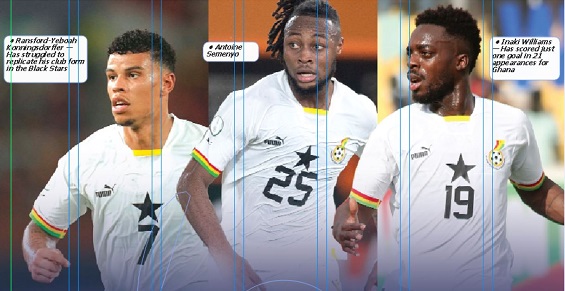
Essien calls for end to blame game, defends Inaki, others over black Stars form
Ghanaian football legend Michael Essien has strongly dismissed claims that players born abroad struggle to perform for the Black Stars due to cultural disconnect, calling the suggestion unfounded and unfair.
Essien, a pivotal figure in Ghana’s football history, responded to criticisms aimed at dual-nationality players such as Spain-born Iñaki Williams and London-born Antoine Semenyo.
Despite excelling at their clubs—Williams has been a key player for Athletic Bilbao—these players have struggled to replicate their form for the Black Stars, with Williams managing just one goal since his 2022 debut.
Speaking on Sporty FM, Essien refuted the notion that cultural differences were to blame. “Sometimes we are funny. When we see these Ghanaians born in Europe, we invite them, and then when things are not going well, we say, ‘Oh, they don’t fit in; they don’t know our culture.’ For me, that’s a bit b**t,” Essien stated bluntly.
This criticism, he suggested, unfairly shifts the blame onto players rather than addressing the underlying issues affecting the team’s performance.
His remarks come as some fear that such negativity could deter other talented players with Ghanaian heritage from committing to the national team.
Essien’s words carry weight, given his remarkable career. As one of Ghana’s most celebrated footballers, he played a key role in the Black Stars’ maiden World Cup qualification in 2006 and won multiple Premier League titles and a Champions League crown with Chelsea.
His experience and achievements lend authority to his call for a more inclusive and supportive approach to integrating dual-nationality players.
However, not everyone agrees with Essien’s perspective. Former Black Stars captain Stephen Appiah recently highlighted the challenges faced by players born overseas during a meeting with Parliament's sub-committee on sports. Appiah suggested that cultural and language barriers often hinder these players from fully adapting to the team’s environment.
“Some of these players don’t fully understand what it means to wear the Ghana jersey,” Appiah argued. “In our time, after lunch or dinner, we would sit, interact, and pray together. Today, foreign-born players find it difficult to adapt because they don’t know the culture or speak the local dialect.”
Appiah pointed to the struggles of Williams and others as evidence of this disconnect, noting that while they thrive at their clubs, they often fail to deliver the same level of performance for Ghana.
His remarks also emphasised the need to recreate a cohesive team culture akin to the camaraderie of his playing days.
The contrasting views of Essien and Appiah underscore a larger debate about the integration of foreign-born players into the Black Stars.
While Essien champions a more welcoming and understanding approach, Appiah’s concerns highlight the challenges of blending diverse backgrounds into a unified team.
